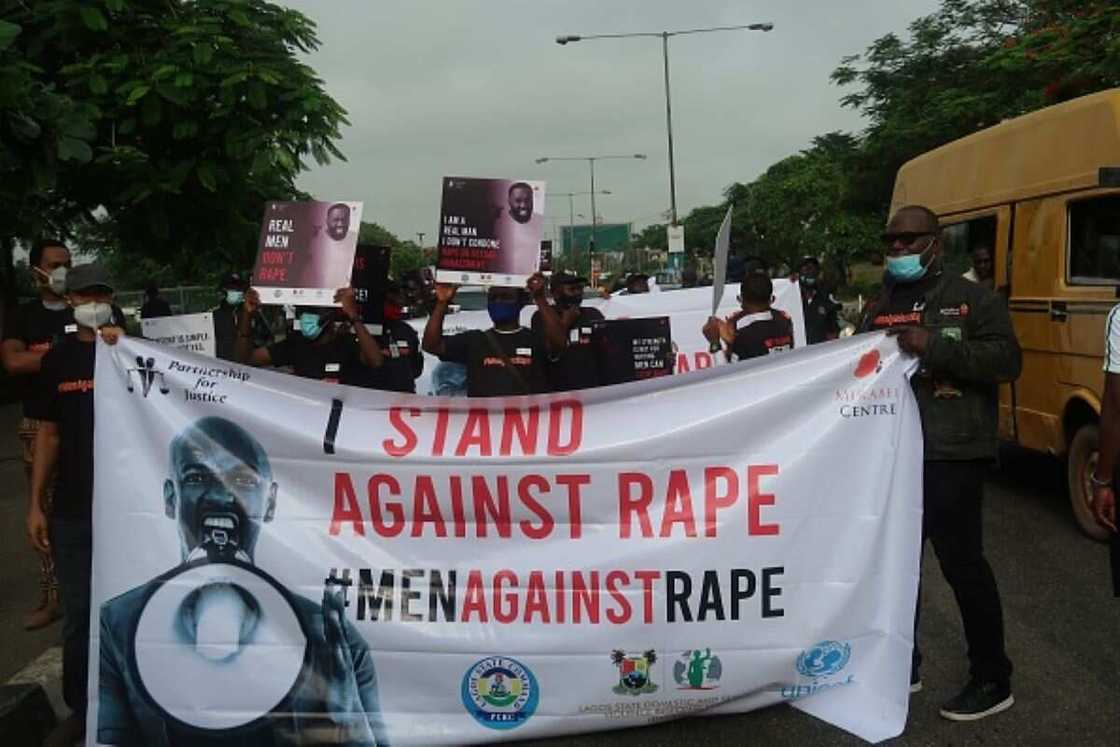Tackling Sexual and Gender-Based Violence in Ebonyi Amidst COVID-19 by Olivia Samuel
Editor's note: Journalist Gift Olivia Samuel, writes on tackling sexual and gender-based violence in Ebonyi state, with a focus on the commendable contributions of civil society organisation, Connected Development.
PAY ATTENTION: Join Legit.ng Telegram channel! Never miss important updates!
Since the advent of the Coronavirus disease (COVID-19) pandemic and the subsequent lockdowns that ensued, Sexual and Gender-Based Violence (SGBV) has been exacerbated and many victims who were at the mercy of their abusers due to the lockdowns are still trapped with them, despite the fact that things are gradually returning to normal.
It is estimated that one in three women globally experience either physical or sexual intimate partner violence or non-partner sexual violence in their lifetime and these figures, as supported by the Nigeria Demographic and Health Survey (2018 NDHS), are mirrored in Nigeria with 30 percent of girls and women aged between 15 and 49 reported to have experienced sexual abuse.

Source: Getty Images
PAY ATTENTION: Get the Latest Nigerian News Anywhere 24/7. Spend less on the Internet!
Research has shown that Nigeria's SGBV crisis is deeply rooted in harmful patriarchal social, cultural, traditional, and religious norms. Also, the increase in violence against women and girls due to COVID-19 shows that in terms of SGBV data harmonization nationwide, there remains a lot to be done. Nonetheless, there is a respite for the victims of SGBV as huge progress has been made in the last few months in realizing the goal of ending violence against women and girls.
In order to give them a voice, the National Gender-Based Violence Dashboard—ReportGBV by the Federal Ministry of Women Affairs (FMWA) was established in the year 2020 to report on violence against women and girls in Nigeria.
Statistics from this National Gender-Based Violence Dashboard revealed that Nigeria recorded 3,824 reported cases of SGBV between April 2020 to April 2021, with only 11 convictions nationwide. A breakdown of the data showed that out of the 3,824 reported cases, 118 were fatal cases, 203 closed cases, 735 open cases, and only 11 convicted perpetrators.

Read also
Just in: Police arrest 5 IPOB/ESN members who murdered security operatives in Imo, recover weapons
Despite these figures, violence against women and girls is largely underreported, and even when reported, prosecutions are slow. This was the reason the minister of women affairs, Dame Pauline Tallen on Tuesday, April 13, 2021, while inaugurating the Strategic Knowledge Management National Technical Working Group On Sexual and Gender-Based Violence in Nigeria [SKMTWG] in Abuja, said the figure of convicted cases has "exposed the justice system in Nigeria."
Focusing on Ebonyi state, statistics from the dashboard from the month of April 30, 2020, to April 30, 2021, revealed that out of the 300 reported cases, five (5) were fatal cases, 31 closed cases, 53 open cases, and only four (4) convicted perpetrators. The reported violence ranges from physical assault, rape, sexual assault, to child abuse and neglect in the 13 local government areas of the state. This is regardless of the fact that Ebonyi state has adopted the Violence Against Persons (Prohibition) Act 2015 (VAPP)—An Act to eliminate violence in private and public life, prohibit all forms of violence against persons, and provide maximum protection and effective remedies for victims and punishment of offenders; and for related matters.
Aside from the VAPP Act, Ebonyi state in 2010 adopted the Child Rights Act (2003). This law guarantees the rights of all children in Nigeria to survival, a name, family life, private life, dignity, recreation, cultural activities, health services, and education. Although these laws are present in the State, SGBV still persists with a low conviction rate.
To tackle this menace in Ebonyi state, Connected Development (CODE) - a non-governmental organisation whose mission is tied to achieving the Sustainable Development Goals (SDGs) and driving social change through the instrumentality of informed engagement in the governance process, and Kachem Young Initiative (KYI) in partnership with the UN-Spotlight Initiative and the European Union, joined forces with the Ebonyi state government and other Civil Society Organisations to fight against SGBV as well as Intimate Partner Violence (SGBV/IPV) by working to adopt the National Action Plan that ensures gender-responsive budgeting to the state's realities.
The organisations on March 29, 2021, reviewed the National Action Plan for eliminating SGBV/IPV, where Melva Uguru of Kachem Young Initiative reiterated that gender-responsive budgeting is crucial to eliminating all forms of SGBV/IPV in the state, hence the need to adopt the said Action Plan.
In view of the final adoption of the State's Action Plan, the CODE team including Mr. Okolo Kingsley of the FMWAs; Kalu N. Kalu, assistant director federal ministry of revenue, budgets, and planning; and Evang. Chukwuma Elom of Family Succour, office of the Ebonyi state First Lady, on the 30th of March 2021, paid an advocacy visit to the state's ministry of women affairs and social development, the state’s ministry of finance, and the budgets and planning commission.
Received by Mrs Florence Nwali, the permanent secretary of the MOWA, and Mr Orlando Okechukwu Nweze, Ebonyi state commissioner for finance, both ministries resolved to work together with the CODE team of Ebonyi state on the final adoption of the State's Action Plan to ensure more specific and gender-responsive budgeting for the state.
In the same vein, CODE in partnership with the UNWomen Spotlight Initiative and the European Union trained stakeholders in Ebonyi state on measures meant to strengthen advocacy and eliminate SGBV. The participants were trained to carry out strategic advocacy at all levels, initiate public sensitization on SGBV, and track women-related allocation in financial budgets and policies.
The workshops which culminated in developing blueprints for women's strategic focus towards SGBV in the state, had participants developing a State Action Plan on eliminating Violence Against Women and Girls (VAWG) /SGBV /HP, and ensuring gender-responsive budgeting. Here, it was however discovered that most participants were unaware of the existence of the legal frameworks adopted by the state, such as the VAPP laws of Ebonyi state, Child Rights Act, etc.
CODE in a recommendation, called for grassroots' awareness on the legal frameworks which protect women/ girls/ children's rights be created, and urged the state to be keener on implementation, and also for relevant stakeholders in the state to be further engaged subsequently as part of the action plan.
The campaign by CODE will definitely turn the tide and tackle Gender-Based Violence, achieve a world free of sexual violence where women have equal rights, access to resources that they need, and are able to live full and happy lives. CODE has also shown that ending gender-based violence involves addressing fundamental inequalities and recognizing that women’s rights are human rights and to achieve this, awareness has proven to be key, as it is the first line of prevention.
For Nigeria as a whole and Ebonyi state in particular to tackle VAWG/ SGBV, the justice system needs to rise up and ensure that perpetrators of GBV are prosecuted speedily to serve as a deterrent to others. Also, states yet to domesticate the Child Rights Act and the Violence Against People (Prohibition) Act should do so, to address the issues being reported across the states, create a conducive environment for victims to speak up, and ensure a gender-responsive budget to tackle this menace.
Source: Legit.ng




